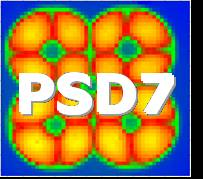Speaker
Dr
Dhiren Kataria
(Mullard Space Science Laboratory, University College London)
Description
Position sensitive micro-channel plate detectors are attractive for
space plasma instruments but have a number of limitations. Most of
the techniques have limited global rate handling and require the MCP
to run at high gain with MCP lifetime implications. In addition,
available mass and power resources limit the number of channels of
readout electronics.
A fast position sensing technique has been developed that is well
suited for MCP-based space plasma applications. The output charge
from the MCP falling on an anode pixel is capacitively split to two
separate channels of readout electronics. Introducing a time
difference between the channels and choosing an appropriate readout
pattern provides unique identification of the position of the
incoming event. The time difference can be due to differences in the
amplitude of the signal as described in (J.S.Lapington, Nucl. Instr.
and Meth., 513 (2003) 132) or due to discreet delays introduced in
the system. The channels can be interleaved so that each readout
channel can be connected to several pixels, reducing the total
number of readout channels and the performance of the system can be
optimised depending on the resolution, rate-handling and lifetime
requirements of the instrument. Details of the application and
preliminary results with an electrostatic plasma analyser are
presented.
Primary author
Dr
Dhiren Kataria
(Mullard Space Science Laboratory, University College London)
